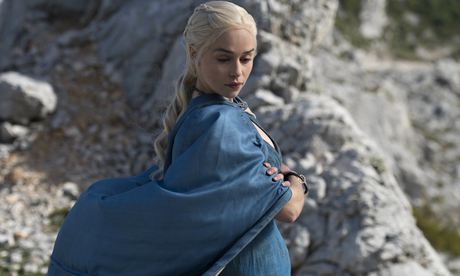
For many long months we starved. The best we could do was rewatch old episodes to remind ourselves of the many ingredients that make up this densely populated drama.
I first felt the addictive power of Game of Thrones when I was prime minister, living in a world where power was also pursued relentlessly, albeit far less colourfully. Certainly the characters of my world were nowhere near as good looking or exotically dressed.
The staff who worked with me most closely talked in a language I didn't understand, discussing the Wall and the White Walkers, the Iron Throne and dragonglass. During moments of rest, the police on my protection detail would be hunched over iPads watching and talking the same strange lingo.
Drawn in, I binged on series one over three days on brief Christmas leave in 2012. I devoured the second and third as soon as I could. Fiction and reality started to collide. Returning to my office after an aborted coup in March 2013, I was greeted with posters of sword fighting with the slogan: 'What do we say to the god of death? Not today.' I made it known I was barracking for the Khaleesi. After all, what girl has not yearned for a few dragons when in a tight spot?
And now we have a new series of Game of Thrones to savour. Around the world, hair plaited in unusual ways, we poured our glasses of wine and settled in for the opening episode of season four.
This first course of the feast was delicious, delivering all the flavours we've been missing. The characters, plot lines and places are back - both glittering and dark. The intrigue, the brutality and the passion continue unabated.
The genius of Game of Thrones is that in this rich imagining of a world redolent of the medieval, the rules of a middle ages morality play have been so thoroughly discarded.
It is not the story of Everyman, who on the road to death and judgment confronts the forces that have shaped his life: family, friends, material possessions, knowledge, beauty, strength, and comes to see that goodness is what should predominate.
Instead, the lot of the everyman and everywoman forms only a backdrop to the story of would-be rulers and their clashes for power. These titans, and those who surround them, overwhelmingly and stubbornly refuse to conform to the simple premise of triumphant good versus vanquished evil. So the heroic Ned Stark loses his head, and his family is entrapped in the horror of the Red Wedding.
Its evil echo reverberates in this new episode: Sansa refuses to eat, while the wicked King Joffrey is ascendant. But there are signs everywhere that the kaleidoscope that constantly shifts the pieces of this puzzle is going to turn again.
There are newcomers to meet, who may be good, evil or a complex mix of both. Dorne, a part of the Seven Kingdoms, sends the second son of its ruling family to attend the upcoming Royal Wedding, as a calculated insult. This gesture is more than symbolic. It speaks of a desire for revenge for an old wrong, the rape and murder of a princess by a man in the Lannisters' command. As the Dorne prince menacingly says to Tyrion: 'Tell your father I'm here! And tell him the Lannisters aren't the only ones who pay their debts.'
There are emotional connections to reassess. The King Slayer, having thrown a child, Bran, from a tower without the slightest show of emotion, amazingly managed to become the subject of our sympathy in the last season. Now, clean and handsome again, is he returning to type? Meanwhile, the Hound, a man of violence, seems to be becoming ever more human, an anti-hero with goodness in him.
In this world of constant war, female characters have never been relegated to the sidelines. They confound the stereotypes. Being a wife or being a whore does not mean being a bit player in a male drama. The women of combat command our attention once again.
The Khaleesi, the mother of dragons, has been freeing slaves and preparing for war. Now her dragons are quarrelsome teenagers. Will she learn the force of words once spoken to Jon Stark, that wild creatures cannot be trusted?
The Wildling, Ygritte, born of a cold world, now simmers with love, rejection and violence. As part of a growing threat to the Seven Kingdoms from beyond the Wall, what will her lust for vengeance mean?
The child combatant, Arya Stark, necessarily discarded playfighting and embraced the real thing. But there is a difference between the loss of innocence and the growth of darkness. Is she moving from the light?
We cannot yet see how this will come together - whether the long arc of this story will take us to Everyman's judgment day, where good is rewarded and evil punished. We can't even imagine what this will look like, when good and evil intermingle so seamlessly in the words, deeds and souls of so many. How much will we learn in season four?
In Australia, winter is coming. What better way to spend its evenings than immersed in Game of Thrones?
Post By http://www.theguardian.com/tv-and-radio/2014/apr/07/game-of-thrones-parallels-prime-minister
0 comments Blogger 0 Facebook
Post a Comment